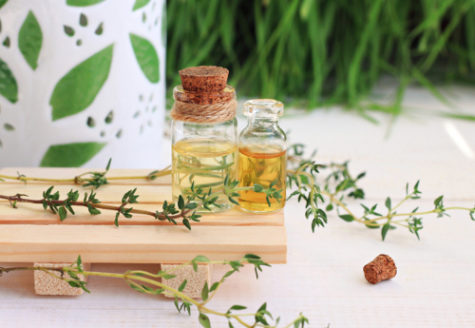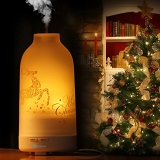Thyme Essential Oil
There are many types of thyme, some of which can be used safely in all situations and some which cannot. Thyme oil ranks high on the versatility index of essential oils. Diffused, it boosts wellness, fortifying the lungs and clearing the breath.
Thyme has notable antiviral, antibiotic, antiseptic, and diuretic properties and should be used with great care.
- Application:
Thyme oil should never be used undiluted on the skin. It can be applied topically at very low dilutions of 1% or less or used in a blend as a compress. It may also be used in direct inhalation or diffused. Add to food or soy / rice milk as a dietary supplement or flavoring.
- Fragrant Influence:
It may be beneficial in helping to overcome fatigue and exhaustion after illness.
- Safety Data:
Overuse of Thyme essential oil can stimulate the thyroid gland and lymphatic system. Like many good things, it must be used in moderation. It should never be applied to the skin undiluted and should not be used on children unless it is within the chemotype Thyme linalol. It can be irritating for the mucus membranes and it should not be used by those who are pregnant.
Thyme is a vital component of the Basic Care Kit because of its powerful antiviral properties. When flu is around it is a wonderful oil to have on the diffuser. It assists in the elimination of toxic wastes from the body. It is used in the treatment of a wide range of conditions including whooping cough, warts, rheumatism, neuralgia, fatigue, and acne.
Inhaled, Thyme oil is uplifting and relieves depression, stimulates the respiratory system and relieves the spasm of asthma, is an antiseptic for all sorts of muccoid conditions, kills bacteria in the air, and is used for bronchitis or pneumonia. Thyme oil is also mildly sedating and can be used for insomnia.
Internal dose is three to five drops in honey water three times a day.
It is also extremely useful in antiseptic powders, hair and skin care regimes, and cooking. Just to make it a perfect all-rounder, thyme will discourage all manner of parasites and insects from invading your home.
In Greek, “thymos” means “to perfume”; one of thyme’s many traditional uses was in fumigation. Ancient Egyptians used thyme oil for embalming. In many ancient cultures, it was believed that thyme instilled the virtues of strength, energy, and bravery.
Variations
There are six different chemotypes of T. vulgaris:
- Thymol – low altitude close to the sea
- Carvacrol – low altitude close to the sea
- Linalool – in the sun on exposed slopes
- Geraniol – rare and mixed with linalool at high altitudes
- Thuyan-4-ol – very rare and located between thymol/carvacrol and linalool
- α-terpinyl – in the Eastern Mediterranean
Thyme Linalol is especially recommended to kill bacteria and relieve discomfort. It is non-irritating and gentle, and especially recommended for treating children and the elderly or infirm.
Thyme Thuyanol is quite new. It captures much of the overall strength and stimulating properties of the “regular” essence of Thyme as well as its anti-infectious properties. The difference lies in the much higher content of highly desirable terpene alcohols (non-toxic) and the much lower content of irritant and slightly toxic phenols. This oil is stronglhy germicidal (yet non-irritant) and a very good liver stimulant.
Information collected from various sources





Leave a Reply